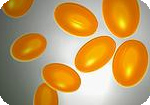Thursday, April 29, 2010
Co-Enzyme Q10: A Vital Energy-Boosting, Health Promoting Nutrient
This valuable nutrient is a powerful antioxidant that has many essential roles in the body. It is vital for providing energy to cells, promoting cell growth and protecting cells from damage. It has benefits for heart health, protects against degenerative diseases, and promotes better health in general, especially for older people.
Co-enzyme Q10, also called CoQ10 or ubiquinone, is a fat soluble compound that is produced naturally in the body. It is ubiquitous, meaning it is found everywhere. Co-enzyme Q10 is best known for its vital function in the production of energy inside cells. It is en essential part of the mitochondria, tiny organs found in cells, which take fat and other substances and convert them into usable energy. This process always requires co-enzyme Q10, in fact it is essential for 90% of cellular energy production.
The heart, skeletal muscle, liver and lungs all use large amounts of energy and therefore co-enzyme Q10 is particularly concentrated in these tissues. Smaller amounts are centered in the brain, kidneys, and intestines, and the rest is in general circulation throughout the body for use as needed.
Co-enzyme Q10 is used to promote cell growth, protect cells from damage and is important in the fight against ageing. This is why it is often listed as an ingredient in anti-ageing creams.
Co-enzyme Q10 also plays a critical role in maintaining the body's supply of Vitamin E. When Vitamin E is 'used up' in its role as an antioxidant protector of cell membranes, coenzyme Q can 'recharge' it, and restore its antioxidant capability.
Numerous studies into co-enzyme Q10 have found that it has benefits for cardiovascular health, including helping heart failure and other degenerative heart diseases in which the heart muscle needs protection from oxygen damage, like angina, arrhythmia and hypertension.
Co-Enzyme Q10 Deficiency
A number of factors including age, illness, cholesterol-lowering drugs and poor nutrition can all decrease the body's ability to produce its own co-enzyme Q10.
A deficiency in this nutrient results in less cellular energy and diminished protection against oxidative stress, which can lead to the production of free radicals that damage proteins, fats and DNA, allowing degenerative diseases to develop.
Studies have reported dramatic decreases in CoQ10 levels and increased oxidative stress associated with the aging process and with many age-related conditions. Healthy people in their 20s readily produce all the CoQ10 they can use, but this ability becomes hindered as years go by through metabolic demands and oxidative stress.
Therefore receiving adequate supplies of CoQ10 is especially important for middle-aged people for supporting and maintaining cardiovascular, neurological and liver health, as well as better overall health. Co-enzyme Q10 is also a powerful antioxidant, so it also defends against oxidative stress and age-related conditions.
Sources of Co-Enzyme Q10
The richest food sources of co-enzyme Q10 are meat, poultry and fish, especially organ meat. Other good sources include soya bean and canola oils, nuts and seeds. There are also small traces found in fruit, vegetables, eggs and dairy products.
Co-enzyme Q10 is also available in supplement form, as ubiquinone or the reduced form of the compound, ubiquinol, a form that has found to be more easily absorbed into the bloodstream. Co-enzyme Q10 is fat soluble, so supplements should always be taken with some type of dietary fat.
Co-Enzyme Q10: A Vital Energy-Boosting, Health Promoting Nutrient
Source : http://www.healthymuslim.com/articles/jicti-co-enzyme-q10-a-vital-energy-boosting-nutrient.cfm
Please visit my new ISLAMIC BLOG
Subscribe to:
Post Comments (Atom)

No comments:
Post a Comment